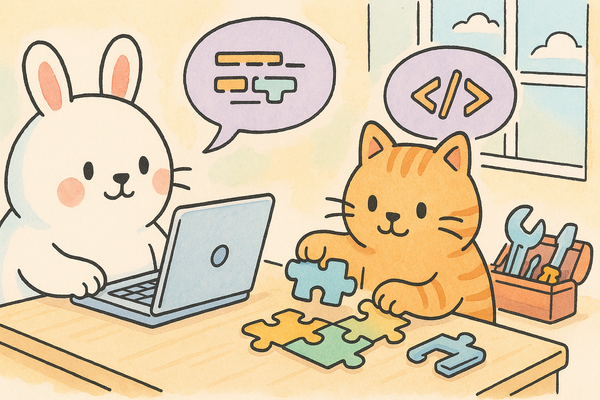Recurse Center Return Statement

The 12-week experience at RC did remind me of the story of the tall, strong, and unbendable Oak that towers over the short, thin, and flexible Reeds. On an average fair weather day, the Oak seems formidable, but in a storm, it's the Reed that prevails.
I came in with a strong idea of what I wanted to work on--an immutable database in the browser as a solution to erasing the network boundary in web apps that are a source of so much complexity. I embarked on a long wandering path before RC following my volition, instincts, and taste in what I found interesting and important to work on. I was ready to execute that with a concentration of other people who were in the same place. I found that conviction tested, and I needed to be more flexible in how I express that conviction.
Initially, I was open to attending the events and seeing what new things were up in the first week. I soon found they were either areas I've already explored to my satisfaction, or they were areas outside of my immediate goals. I was pretty focused until I was sucked in by the ARENA (a LLM mechanistic interpretation course) vortex.
I'm playfully resentful that ARENA took me away from my main line of work but am thankful that I did it. LLMs are going to be important going forward, and the course gave low-level exercises I would have never done myself, and I wouldn't have met as many people otherwise. However while completing ARENA, I was struggling to get the Prolly Tree implementation done that would move me towards my goal.
But then finishing ARENA and breaking through the Prolly Tree implementation by week 5 was a relief. I wasn't where I thought I'd be when it came to my goals, but perhaps I can learn generously while working on CRDTs. That led to the talk on Prolly Trees and Programming languages. And yet, the talks were side quests that took a long time to prepare for. I struggled to square a plan of attack for CRDT composability or for a Merkle-CRDT. By the time I was halfway through RC, I wondered if I was doing the right thing for either my goals, or getting enough out of the RC experience.
For the second half, I retreated to the remote RC equivalent of the 5th floor. I figured I was having a tough time because I didn't really understand CRDTs deeply, despite all the reading. So I needed to do the ARENA equivalent for CRDTs and just start writing code on all the different types of CRDTs from the beginning. This turned out to be the right move for my goals. But it did take me away from getting to know the incoming overlap batch in the 2nd half.
And that's the balance that's so hard to strike at RC, between working on your stuff and being open to meeting others through their work. Everyone I've met had a high slope, regardless of their y-intercept, and is admirable in different ways. Some you see early. Others reveal themselves in time. But all were something I learned from, regardless of how early or late they were in their career.
And it does make you wonder if people know what you learned from them--and I guess that's what niceties are for. I'm certainly not good at giving compliments, and even worse at receiving them. I found it tough to read the niceties all in one sitting. And it also goes to show that I really have no idea what's going on in other peoples' heads. But I thank everyone for taking the time to write one and getting something out of our interactions, whether one-on-one or during a group session.
In the end, when I reflect on the Recurse Center, it is a transformative experience for people due to its focus on individual growth. Most other institutions are attempting to achieve a mission through a coordination of individual action. As such, they try to shape you in their image. Many of us grow up and adult in such an environment, even in educational institutions that purport to grow the individual. So when many of us do RC, it's jarring and disorientating to actually be in the driver's seat. Regardless of how much practice we've had, it's not enough. One consequence of being in the driver's seat is that what you get out of the experience is reflective of, but not an exact function of, what you put in.
And that's the tricky thing. The very thing that you get out of RC may not be what you meant to get out of it, and it requires practice and flexibility to receive it. In a lot of ways, the experience at RC is artificial, but in the way that physicists set up a toy scenario to distill and make clear an essence. It's there to quiet the perturbations on the water, so you can see yourself more clearly.
What helped me through the second half was the realization that RC doesn't end. But RC doesn't end, not just because you can Never Graduate, participate in events, or even apply again. If RC is doing their job right, it doesn't end because you've carried the experience with you changing your actions and mental self-talk, even if you're no longer surrounded by the artificial RC environment to make clear.
Perhaps those who feel like they didn't get as much out of the RC experience as they should have experienced the longest-term growth after RC, reaching for what they felt like they missed.
Good advice is always contextual, but I'll venture some for those halfway through. I'd say what others have repeated: remember to be kind to yourself. Much of it is being able to manage your own psychology through periods of growth. And if you can do that outside of RC, then it'll be something you can carry forth into the world. If you get stuck in any way, reach out to the staff. Not enough people do it. They might not have the exact answers you seek, but they will have seen something similar before. Get help early and get help often.
If you're thinking about applying to the Recurse Center, do it.



